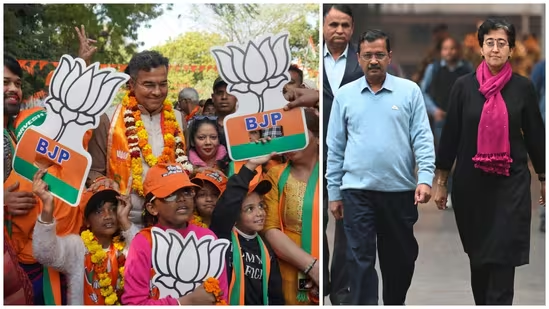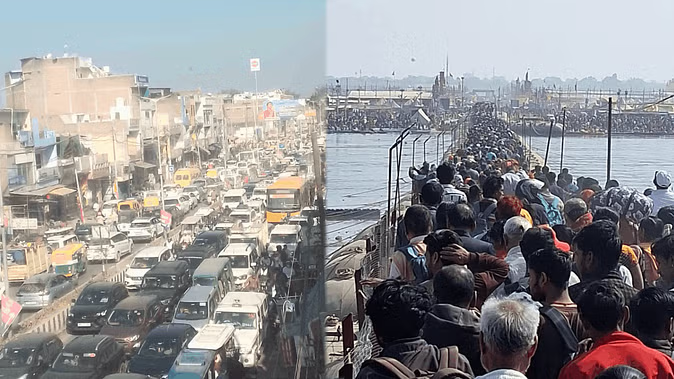ECI Delhi Election Results 2023: A Historic Turnaround as BJP Poised to Script a Triumphant Comeback After 27 Years!

In an electrifying turn of events, the latest updates from the Election Commission of India (ECI) suggest that the Bharatiya Janata Party (BJP) is on the brink of reclaiming power in Delhi after nearly three decades. With trends pointing towards a decisive victory, the BJP has surged ahead, leading or securing wins in a staggering 48 seats , well above the majority mark of 36.
On the other hand, the Aam Aadmi Party (AAP), which had previously dominated the political landscape in the national capital, finds itself trailing significantly. The party is currently ahead or has claimed victory in just 22 seats , falling far short of forming the government this time around.
This dramatic shift in voter sentiment marks a monumental moment in Delhi’s political history, signaling a potential end to AAP’s stronghold and heralding a new era under BJP leadership. As counting progresses, all eyes remain glued to witness how these numbers unfold further.
Stay tuned for live updates, expert analysis, and exclusive insights into what this means for Delhi’s future—and don’t forget to share your thoughts below! Will the BJP’s momentum reshape Indian politics? Let us know in the comments section!
For real-time updates, detailed constituency-wise results, and expert opinions, keep visiting our blog—the ultimate destination for comprehensive election coverage!
#DelhiElections2023 #BJPTriumph #PoliticalShift #LiveUpdates
This outcome marks a seismic shift in Delhi’s electoral dynamics, signaling not only a change in governance but also a potential realignment of voter priorities. For years, AAP, under the leadership of Arvind Kejriwal, had positioned itself as the voice of the common man, focusing heavily on education, healthcare, and anti-corruption measures. However, it seems that voters have now opted for a new direction, placing their trust in the BJP’s vision for development, infrastructure, and economic growth.
What Led to This Dramatic Upset?
The BJP’s resurgence can be attributed to several key factors:
- Strong Leadership & Ground Game : Prime Minister Narendra Modi and Chief Ministerial candidate Manoj Tiwari spearheaded a robust campaign that resonated with voters across all demographics. Their emphasis on national pride, security, and inclusive development struck a chord with Delhiites who were looking for fresh ideas and renewed energy.
- Anti-Incumbency Factor : While AAP had delivered commendable work in areas like education and public health, critics argue that the party may have become complacent over time. Allegations of mismanagement, unfulfilled promises, and internal rifts within the AAP camp likely contributed to growing dissatisfaction among voters.
- BJP’s Strategic Alliances : The party successfully forged alliances with local leaders and community groups, ensuring grassroots-level mobilization. Additionally, its focus on welfare schemes such as affordable housing, improved public transport, and enhanced civic amenities appealed directly to urban and semi-urban voters.
- Youth & First-Time Voters : Young voters, who make up a substantial portion of Delhi’s electorate, seemed particularly drawn to the BJP’s aspirational narrative. Campaigns highlighting job creation, entrepreneurship opportunities, and digital innovation captured the imagination of this demographic.
- Effective Use of Social Media : In an age where digital platforms play a pivotal role in shaping opinions, the BJP leveraged social media masterfully. Engaging content, targeted messaging, and viral campaigns helped amplify their reach and connect with younger audiences.
The Fallout for AAP
For the Aam Aadmi Party, this defeat represents more than just a loss—it’s a wake-up call. Once hailed as a beacon of hope for participatory democracy, AAP now faces tough questions about its future trajectory. Critics argue that the party failed to adapt to evolving voter expectations and neglected critical issues such as traffic congestion, pollution, and water scarcity. Moreover, allegations of infighting and poor decision-making have cast a shadow over its once-stellar reputation.
Arvind Kejriwal, who has been synonymous with AAP’s identity, will need to introspect deeply if he hopes to revive the party’s fortunes. Whether this setback prompts a course correction or leads to further decline remains to be seen.
ECI Delhi Election Results 2023: A Political Earthquake Shakes the Capital as BJP Makes a Historic Comeback!
In a stunning turn of events that has sent shockwaves through India’s political landscape, the Bharatiya Janata Party (BJP) appears poised to reclaim power in Delhi , ending a 27-year hiatus. The latest trends and results from the Election Commission of India (ECI), as of 2 PM today, paint a clear picture: the BJP is leading or has won an impressive 48 seats , surpassing the majority mark of 36 by a significant margin. Meanwhile, the ruling Aam Aadmi Party (AAP) , which had enjoyed a dominant run in the capital for nearly a decade, trails far behind with just 22 seats —a performance that falls woefully short of expectations.
This outcome marks a seismic shift in Delhi’s electoral dynamics, signaling not only a change in governance but also a potential realignment of voter priorities. For years, AAP, under the leadership of Arvind Kejriwal, had positioned itself as the voice of the common man, focusing heavily on education, healthcare, and anti-corruption measures. However, it seems that voters have now opted for a new direction, placing their trust in the BJP’s vision for development, infrastructure, and economic growth.
What Led to This Dramatic Upset?
The BJP’s resurgence can be attributed to several key factors:
- Strong Leadership & Ground Game : Prime Minister Narendra Modi and Chief Ministerial candidate Manoj Tiwari spearheaded a robust campaign that resonated with voters across all demographics. Their emphasis on national pride, security, and inclusive development struck a chord with Delhiites who were looking for fresh ideas and renewed energy.
- Anti-Incumbency Factor : While AAP had delivered commendable work in areas like education and public health, critics argue that the party may have become complacent over time. Allegations of mismanagement, unfulfilled promises, and internal rifts within the AAP camp likely contributed to growing dissatisfaction among voters.
- BJP’s Strategic Alliances : The party successfully forged alliances with local leaders and community groups, ensuring grassroots-level mobilization. Additionally, its focus on welfare schemes such as affordable housing, improved public transport, and enhanced civic amenities appealed directly to urban and semi-urban voters.
- Youth & First-Time Voters : Young voters, who make up a substantial portion of Delhi’s electorate, seemed particularly drawn to the BJP’s aspirational narrative. Campaigns highlighting job creation, entrepreneurship opportunities, and digital innovation captured the imagination of this demographic.
- Effective Use of Social Media : In an age where digital platforms play a pivotal role in shaping opinions, the BJP leveraged social media masterfully. Engaging content, targeted messaging, and viral campaigns helped amplify their reach and connect with younger audiences.
The Fallout for AAP
For the Aam Aadmi Party, this defeat represents more than just a loss—it’s a wake-up call. Once hailed as a beacon of hope for participatory democracy, AAP now faces tough questions about its future trajectory. Critics argue that the party failed to adapt to evolving voter expectations and neglected critical issues such as traffic congestion, pollution, and water scarcity. Moreover, allegations of infighting and poor decision-making have cast a shadow over its once-stellar reputation.
Arvind Kejriwal, who has been synonymous with AAP’s identity, will need to introspect deeply if he hopes to revive the party’s fortunes. Whether this setback prompts a course correction or leads to further decline remains to be seen.
What Does This Mean for Delhi?
The BJP’s impending return to power brings with it both excitement and uncertainty. Supporters are optimistic about the party’s ability to deliver transformative changes, including better infrastructure, cleaner streets, and smarter urban planning. However, skeptics caution against overly ambitious promises, urging the incoming administration to prioritize practical solutions over grandiose announcements.
Key challenges awaiting the next government include addressing Delhi’s chronic air pollution crisis, improving public transportation systems, and ensuring equitable access to essential services for all residents. How effectively the BJP tackles these issues will determine whether its victory translates into sustained goodwill or becomes a fleeting moment of glory.
Stay Tuned for More Updates!
As counting continues and final results trickle in, one thing is certain: Delhi’s political landscape has undergone a dramatic transformation. This election will undoubtedly go down in history as a defining moment—not just for the city but for Indian politics at large.
To stay updated with minute-by-minute developments, expert analyses, and exclusive interviews, bookmark our blog and follow us on social media. Share your thoughts in the comments below—what do you think this verdict means for Delhi’s future? Let’s spark a conversation!
Join the discussion using #DelhiDecides2023 #BJPVictory #AAPChallenge.
Why Should You Keep Reading Our Blog?
Our team of seasoned journalists and political analysts provides unparalleled insights into the stories behind the headlines. From dissecting voter behavior to predicting future trends, we leave no stone unturned in bringing you the most comprehensive coverage of India’s elections. Don’t miss out—subscribe now to get instant notifications whenever we publish something new!
Let’s navigate this historic moment together. Welcome to the pulse of Indian democracy!



